Comparing Leadership and Management at Tesco: Roles and Functions
VerifiedAdded on 2020/10/23
|22
|6400
|112
Report
AI Summary
This report provides a detailed analysis of leadership and management practices within Tesco, a multinational retail company. It begins by comparing the distinct roles and characteristics of leaders and managers, highlighting their differing approaches and functions within an organizational context. The report then delves into the roles of leadership and managerial functions across various decisive situations, such as conflict resolution, labor turnover, and miscommunication, within Tesco's operational environment. It explores diverse management approaches including system, trait, and behavioral approaches, along with classical management theories, to understand their strengths and weaknesses. Furthermore, the report examines the impact of the business environment on operational management and decision-making, offering insights into how leaders and managers navigate challenges and achieve business objectives. Ultimately, the report provides a comprehensive overview of leadership and management strategies, emphasizing their importance in achieving Tesco's goals.
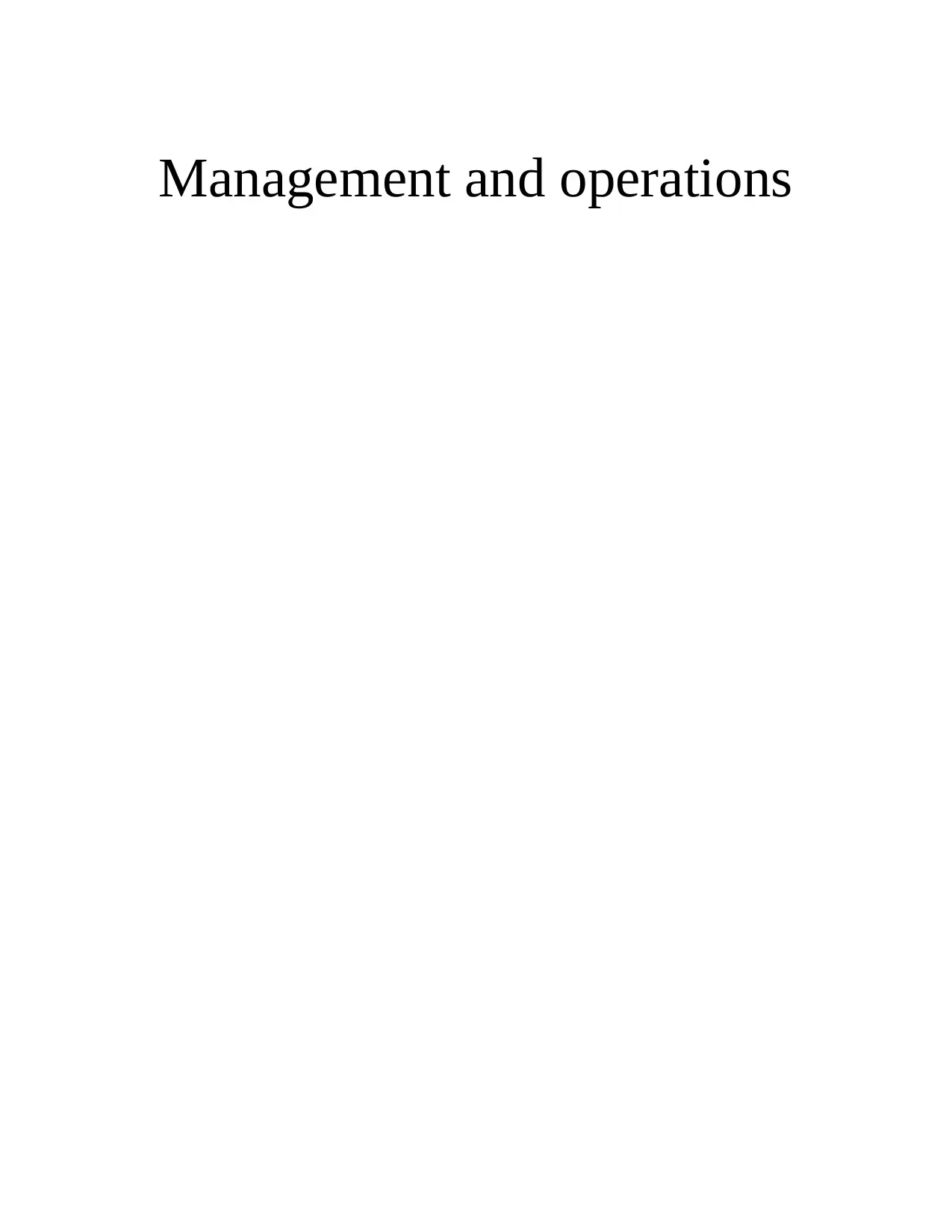
Management and operations
Paraphrase This Document
Need a fresh take? Get an instant paraphrase of this document with our AI Paraphraser
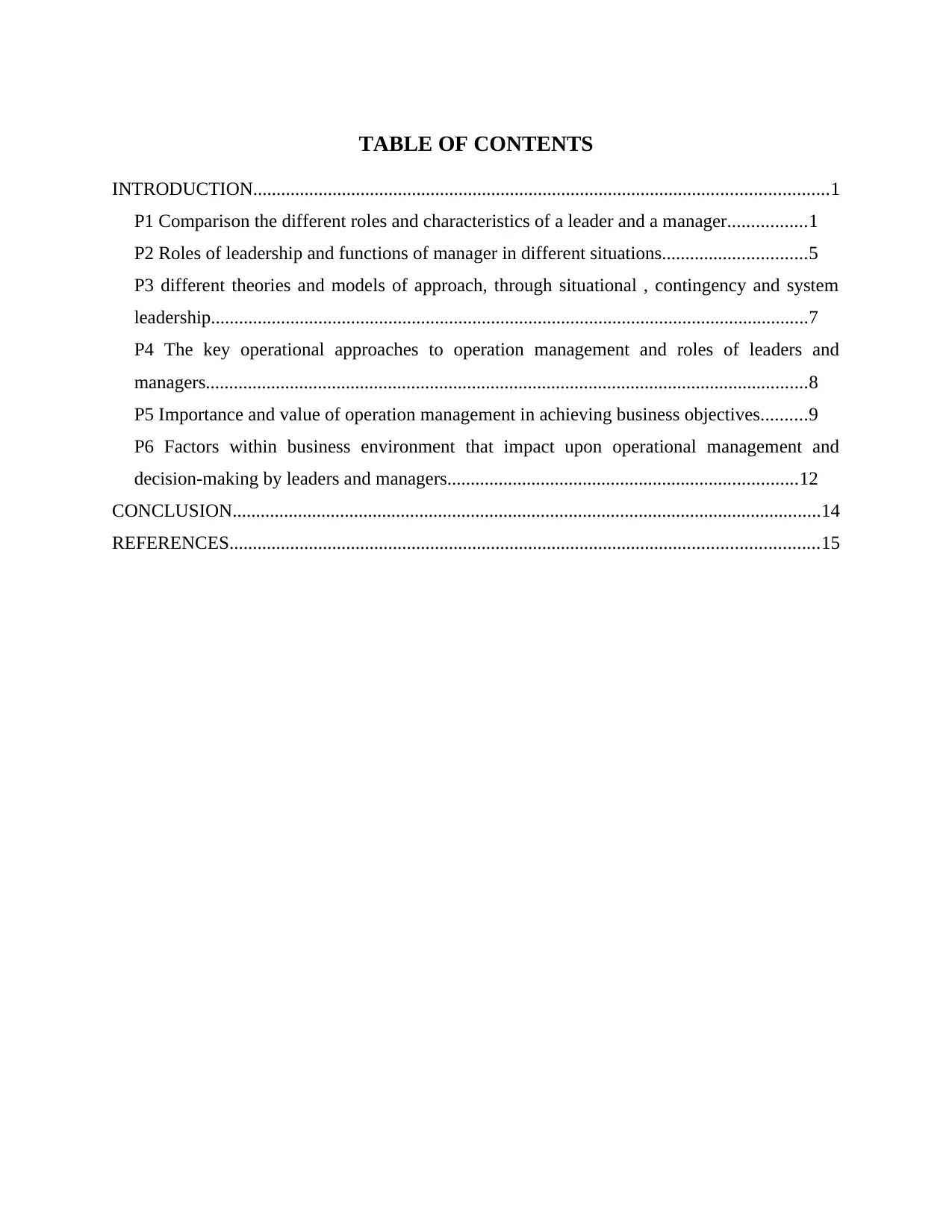
TABLE OF CONTENTS
INTRODUCTION...........................................................................................................................1
P1 Comparison the different roles and characteristics of a leader and a manager.................1
P2 Roles of leadership and functions of manager in different situations...............................5
P3 different theories and models of approach, through situational , contingency and system
leadership................................................................................................................................7
P4 The key operational approaches to operation management and roles of leaders and
managers.................................................................................................................................8
P5 Importance and value of operation management in achieving business objectives..........9
P6 Factors within business environment that impact upon operational management and
decision-making by leaders and managers...........................................................................12
CONCLUSION..............................................................................................................................14
REFERENCES..............................................................................................................................15
INTRODUCTION...........................................................................................................................1
P1 Comparison the different roles and characteristics of a leader and a manager.................1
P2 Roles of leadership and functions of manager in different situations...............................5
P3 different theories and models of approach, through situational , contingency and system
leadership................................................................................................................................7
P4 The key operational approaches to operation management and roles of leaders and
managers.................................................................................................................................8
P5 Importance and value of operation management in achieving business objectives..........9
P6 Factors within business environment that impact upon operational management and
decision-making by leaders and managers...........................................................................12
CONCLUSION..............................................................................................................................14
REFERENCES..............................................................................................................................15
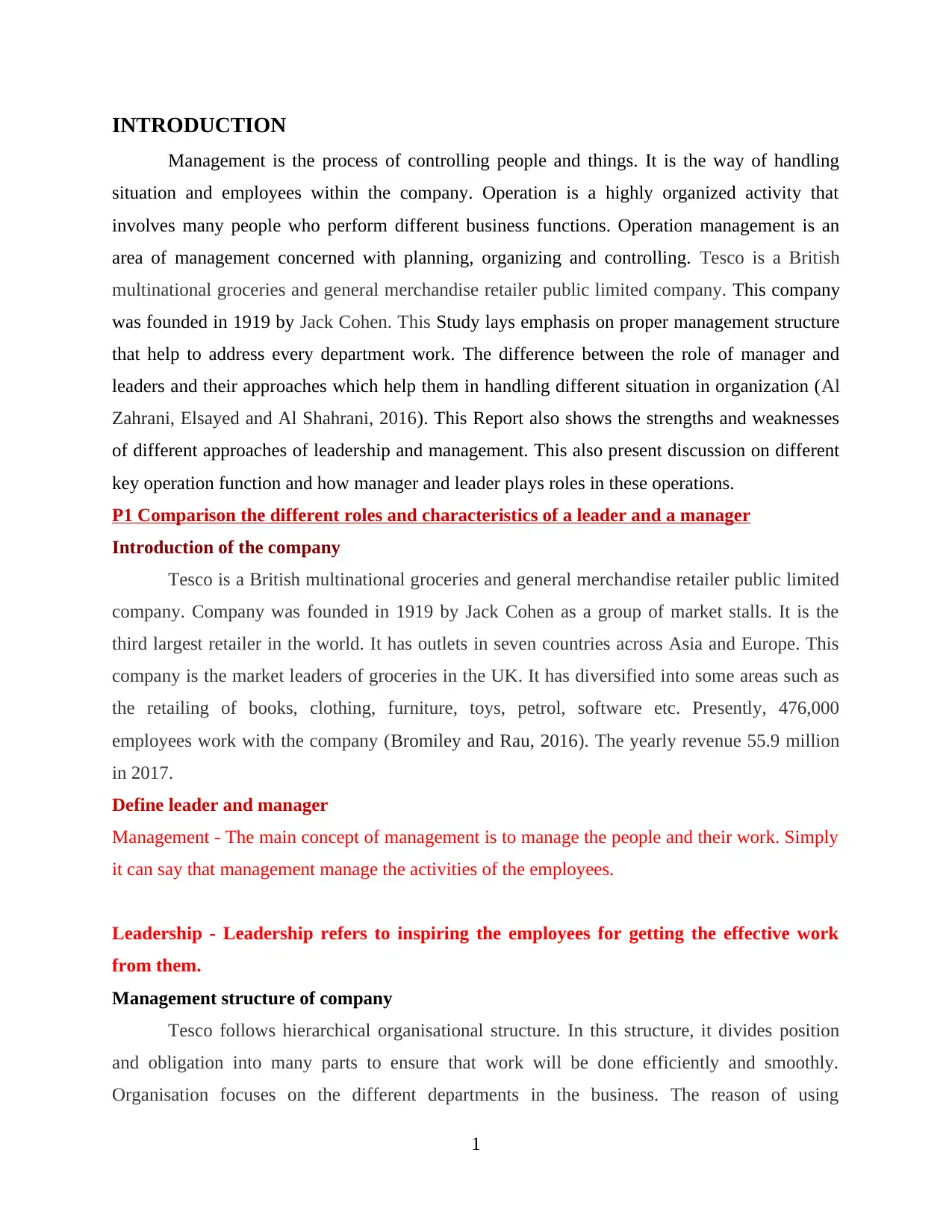
INTRODUCTION
Management is the process of controlling people and things. It is the way of handling
situation and employees within the company. Operation is a highly organized activity that
involves many people who perform different business functions. Operation management is an
area of management concerned with planning, organizing and controlling. Tesco is a British
multinational groceries and general merchandise retailer public limited company. This company
was founded in 1919 by Jack Cohen. This Study lays emphasis on proper management structure
that help to address every department work. The difference between the role of manager and
leaders and their approaches which help them in handling different situation in organization (Al
Zahrani, Elsayed and Al Shahrani, 2016). This Report also shows the strengths and weaknesses
of different approaches of leadership and management. This also present discussion on different
key operation function and how manager and leader plays roles in these operations.
P1 Comparison the different roles and characteristics of a leader and a manager
Introduction of the company
Tesco is a British multinational groceries and general merchandise retailer public limited
company. Company was founded in 1919 by Jack Cohen as a group of market stalls. It is the
third largest retailer in the world. It has outlets in seven countries across Asia and Europe. This
company is the market leaders of groceries in the UK. It has diversified into some areas such as
the retailing of books, clothing, furniture, toys, petrol, software etc. Presently, 476,000
employees work with the company (Bromiley and Rau, 2016). The yearly revenue 55.9 million
in 2017.
Define leader and manager
Management - The main concept of management is to manage the people and their work. Simply
it can say that management manage the activities of the employees.
Leadership - Leadership refers to inspiring the employees for getting the effective work
from them.
Management structure of company
Tesco follows hierarchical organisational structure. In this structure, it divides position
and obligation into many parts to ensure that work will be done efficiently and smoothly.
Organisation focuses on the different departments in the business. The reason of using
1
Management is the process of controlling people and things. It is the way of handling
situation and employees within the company. Operation is a highly organized activity that
involves many people who perform different business functions. Operation management is an
area of management concerned with planning, organizing and controlling. Tesco is a British
multinational groceries and general merchandise retailer public limited company. This company
was founded in 1919 by Jack Cohen. This Study lays emphasis on proper management structure
that help to address every department work. The difference between the role of manager and
leaders and their approaches which help them in handling different situation in organization (Al
Zahrani, Elsayed and Al Shahrani, 2016). This Report also shows the strengths and weaknesses
of different approaches of leadership and management. This also present discussion on different
key operation function and how manager and leader plays roles in these operations.
P1 Comparison the different roles and characteristics of a leader and a manager
Introduction of the company
Tesco is a British multinational groceries and general merchandise retailer public limited
company. Company was founded in 1919 by Jack Cohen as a group of market stalls. It is the
third largest retailer in the world. It has outlets in seven countries across Asia and Europe. This
company is the market leaders of groceries in the UK. It has diversified into some areas such as
the retailing of books, clothing, furniture, toys, petrol, software etc. Presently, 476,000
employees work with the company (Bromiley and Rau, 2016). The yearly revenue 55.9 million
in 2017.
Define leader and manager
Management - The main concept of management is to manage the people and their work. Simply
it can say that management manage the activities of the employees.
Leadership - Leadership refers to inspiring the employees for getting the effective work
from them.
Management structure of company
Tesco follows hierarchical organisational structure. In this structure, it divides position
and obligation into many parts to ensure that work will be done efficiently and smoothly.
Organisation focuses on the different departments in the business. The reason of using
1
⊘ This is a preview!⊘
Do you want full access?
Subscribe today to unlock all pages.

Trusted by 1+ million students worldwide
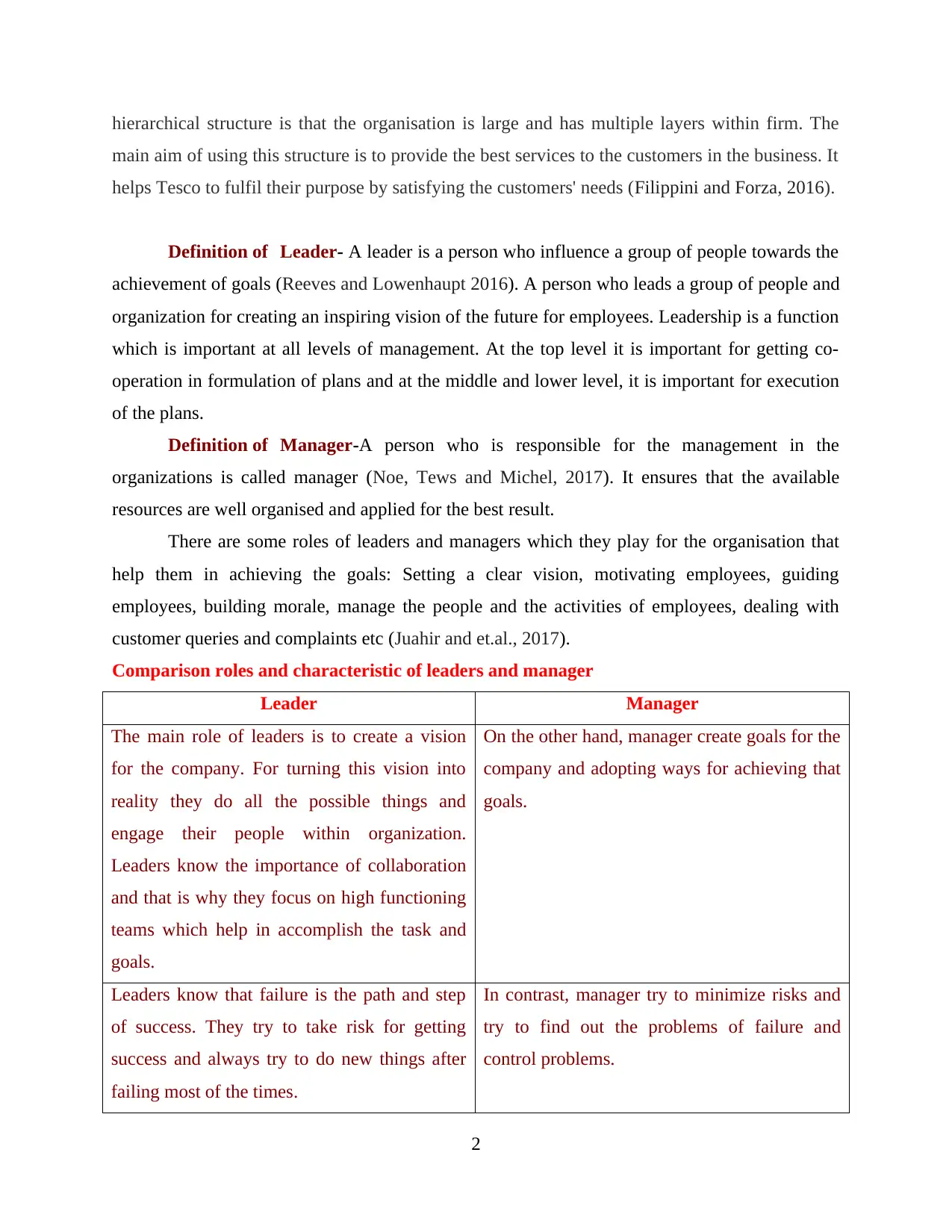
hierarchical structure is that the organisation is large and has multiple layers within firm. The
main aim of using this structure is to provide the best services to the customers in the business. It
helps Tesco to fulfil their purpose by satisfying the customers' needs (Filippini and Forza, 2016).
Definition of Leader- A leader is a person who influence a group of people towards the
achievement of goals (Reeves and Lowenhaupt 2016). A person who leads a group of people and
organization for creating an inspiring vision of the future for employees. Leadership is a function
which is important at all levels of management. At the top level it is important for getting co-
operation in formulation of plans and at the middle and lower level, it is important for execution
of the plans.
Definition of Manager-A person who is responsible for the management in the
organizations is called manager (Noe, Tews and Michel, 2017). It ensures that the available
resources are well organised and applied for the best result.
There are some roles of leaders and managers which they play for the organisation that
help them in achieving the goals: Setting a clear vision, motivating employees, guiding
employees, building morale, manage the people and the activities of employees, dealing with
customer queries and complaints etc (Juahir and et.al., 2017).
Comparison roles and characteristic of leaders and manager
Leader Manager
The main role of leaders is to create a vision
for the company. For turning this vision into
reality they do all the possible things and
engage their people within organization.
Leaders know the importance of collaboration
and that is why they focus on high functioning
teams which help in accomplish the task and
goals.
On the other hand, manager create goals for the
company and adopting ways for achieving that
goals.
Leaders know that failure is the path and step
of success. They try to take risk for getting
success and always try to do new things after
failing most of the times.
In contrast, manager try to minimize risks and
try to find out the problems of failure and
control problems.
2
main aim of using this structure is to provide the best services to the customers in the business. It
helps Tesco to fulfil their purpose by satisfying the customers' needs (Filippini and Forza, 2016).
Definition of Leader- A leader is a person who influence a group of people towards the
achievement of goals (Reeves and Lowenhaupt 2016). A person who leads a group of people and
organization for creating an inspiring vision of the future for employees. Leadership is a function
which is important at all levels of management. At the top level it is important for getting co-
operation in formulation of plans and at the middle and lower level, it is important for execution
of the plans.
Definition of Manager-A person who is responsible for the management in the
organizations is called manager (Noe, Tews and Michel, 2017). It ensures that the available
resources are well organised and applied for the best result.
There are some roles of leaders and managers which they play for the organisation that
help them in achieving the goals: Setting a clear vision, motivating employees, guiding
employees, building morale, manage the people and the activities of employees, dealing with
customer queries and complaints etc (Juahir and et.al., 2017).
Comparison roles and characteristic of leaders and manager
Leader Manager
The main role of leaders is to create a vision
for the company. For turning this vision into
reality they do all the possible things and
engage their people within organization.
Leaders know the importance of collaboration
and that is why they focus on high functioning
teams which help in accomplish the task and
goals.
On the other hand, manager create goals for the
company and adopting ways for achieving that
goals.
Leaders know that failure is the path and step
of success. They try to take risk for getting
success and always try to do new things after
failing most of the times.
In contrast, manager try to minimize risks and
try to find out the problems of failure and
control problems.
2
Paraphrase This Document
Need a fresh take? Get an instant paraphrase of this document with our AI Paraphraser
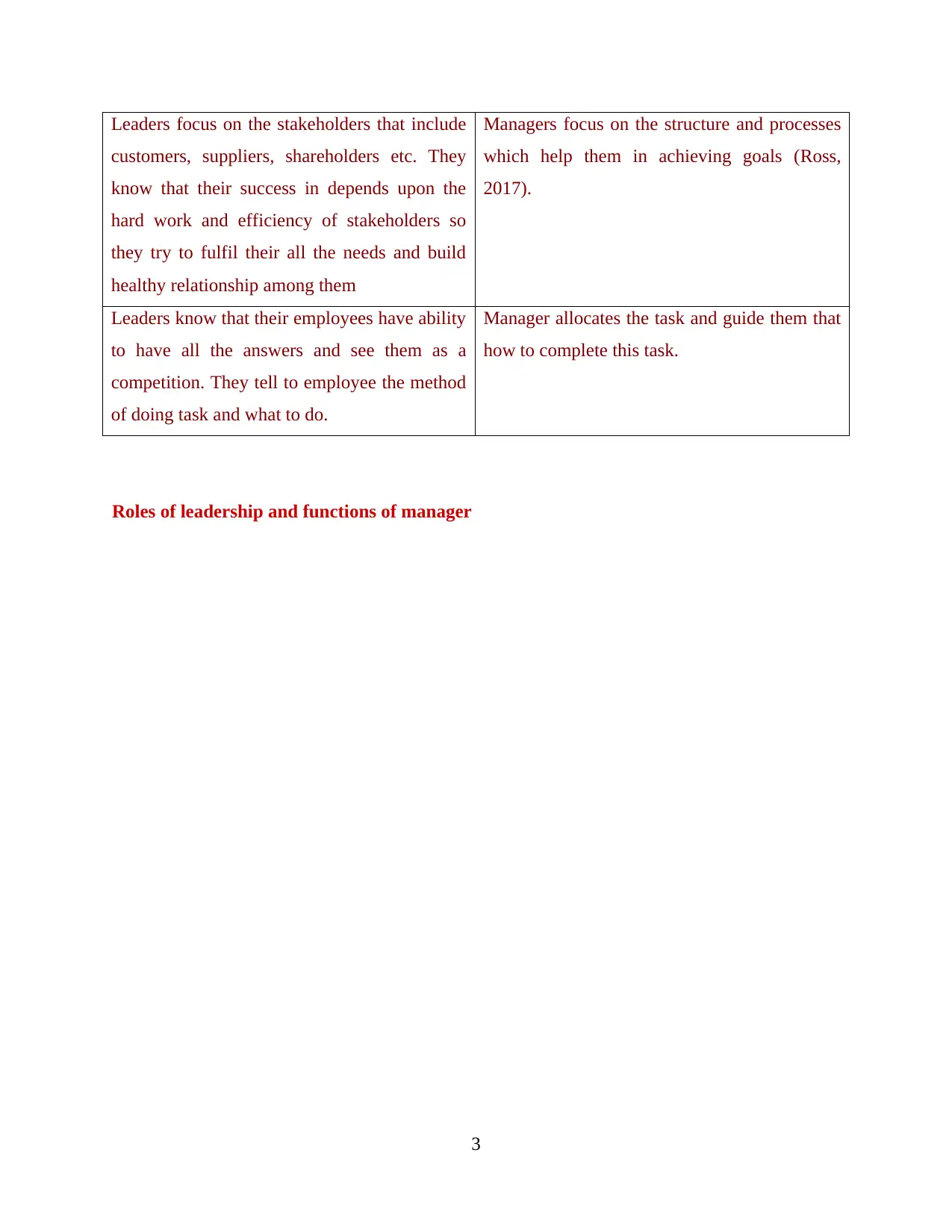
Leaders focus on the stakeholders that include
customers, suppliers, shareholders etc. They
know that their success in depends upon the
hard work and efficiency of stakeholders so
they try to fulfil their all the needs and build
healthy relationship among them
Managers focus on the structure and processes
which help them in achieving goals (Ross,
2017).
Leaders know that their employees have ability
to have all the answers and see them as a
competition. They tell to employee the method
of doing task and what to do.
Manager allocates the task and guide them that
how to complete this task.
Roles of leadership and functions of manager
3
customers, suppliers, shareholders etc. They
know that their success in depends upon the
hard work and efficiency of stakeholders so
they try to fulfil their all the needs and build
healthy relationship among them
Managers focus on the structure and processes
which help them in achieving goals (Ross,
2017).
Leaders know that their employees have ability
to have all the answers and see them as a
competition. They tell to employee the method
of doing task and what to do.
Manager allocates the task and guide them that
how to complete this task.
Roles of leadership and functions of manager
3
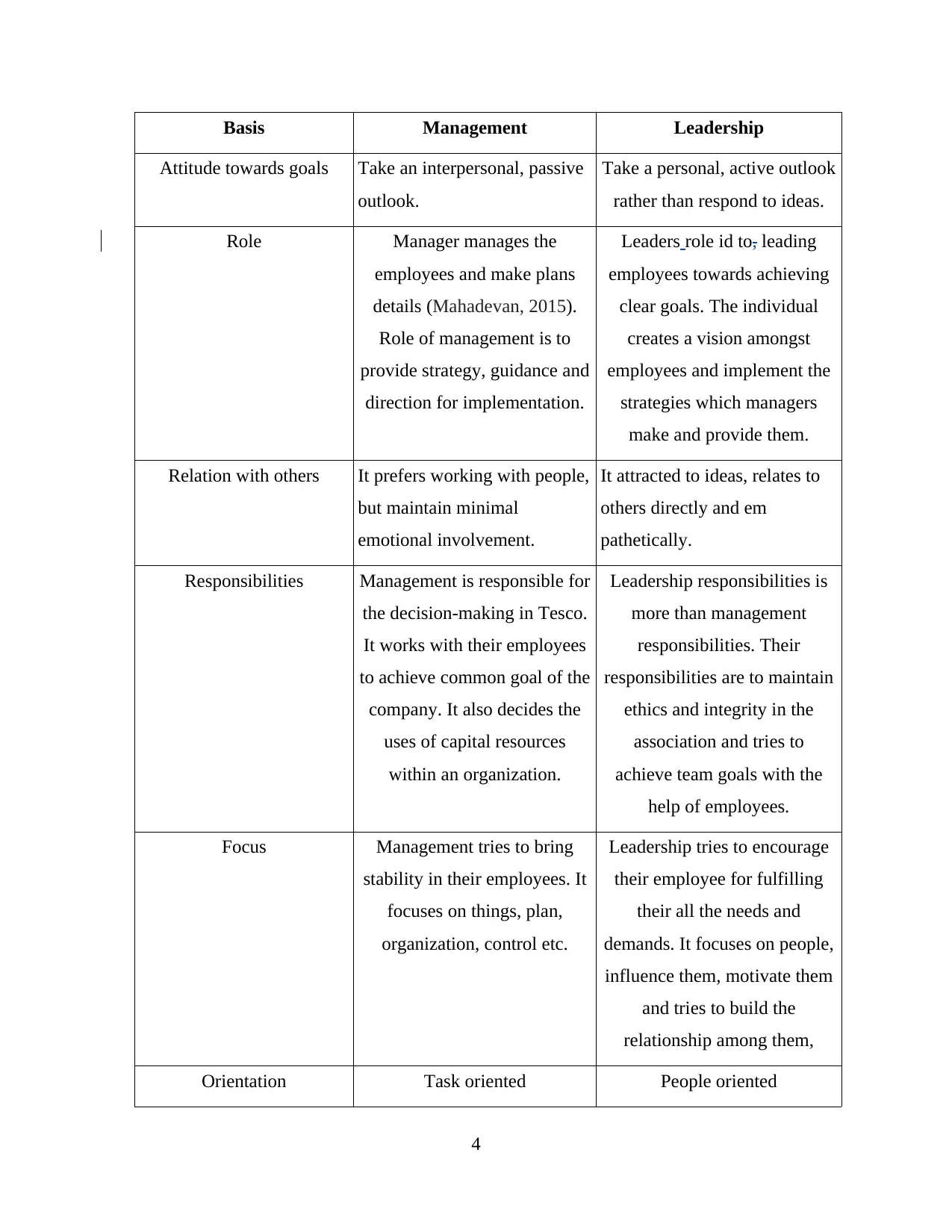
Basis Management Leadership
Attitude towards goals Take an interpersonal, passive
outlook.
Take a personal, active outlook
rather than respond to ideas.
Role Manager manages the
employees and make plans
details (Mahadevan, 2015).
Role of management is to
provide strategy, guidance and
direction for implementation.
Leaders role id to, leading
employees towards achieving
clear goals. The individual
creates a vision amongst
employees and implement the
strategies which managers
make and provide them.
Relation with others It prefers working with people,
but maintain minimal
emotional involvement.
It attracted to ideas, relates to
others directly and em
pathetically.
Responsibilities Management is responsible for
the decision-making in Tesco.
It works with their employees
to achieve common goal of the
company. It also decides the
uses of capital resources
within an organization.
Leadership responsibilities is
more than management
responsibilities. Their
responsibilities are to maintain
ethics and integrity in the
association and tries to
achieve team goals with the
help of employees.
Focus Management tries to bring
stability in their employees. It
focuses on things, plan,
organization, control etc.
Leadership tries to encourage
their employee for fulfilling
their all the needs and
demands. It focuses on people,
influence them, motivate them
and tries to build the
relationship among them,
Orientation Task oriented People oriented
4
Attitude towards goals Take an interpersonal, passive
outlook.
Take a personal, active outlook
rather than respond to ideas.
Role Manager manages the
employees and make plans
details (Mahadevan, 2015).
Role of management is to
provide strategy, guidance and
direction for implementation.
Leaders role id to, leading
employees towards achieving
clear goals. The individual
creates a vision amongst
employees and implement the
strategies which managers
make and provide them.
Relation with others It prefers working with people,
but maintain minimal
emotional involvement.
It attracted to ideas, relates to
others directly and em
pathetically.
Responsibilities Management is responsible for
the decision-making in Tesco.
It works with their employees
to achieve common goal of the
company. It also decides the
uses of capital resources
within an organization.
Leadership responsibilities is
more than management
responsibilities. Their
responsibilities are to maintain
ethics and integrity in the
association and tries to
achieve team goals with the
help of employees.
Focus Management tries to bring
stability in their employees. It
focuses on things, plan,
organization, control etc.
Leadership tries to encourage
their employee for fulfilling
their all the needs and
demands. It focuses on people,
influence them, motivate them
and tries to build the
relationship among them,
Orientation Task oriented People oriented
4
⊘ This is a preview!⊘
Do you want full access?
Subscribe today to unlock all pages.

Trusted by 1+ million students worldwide
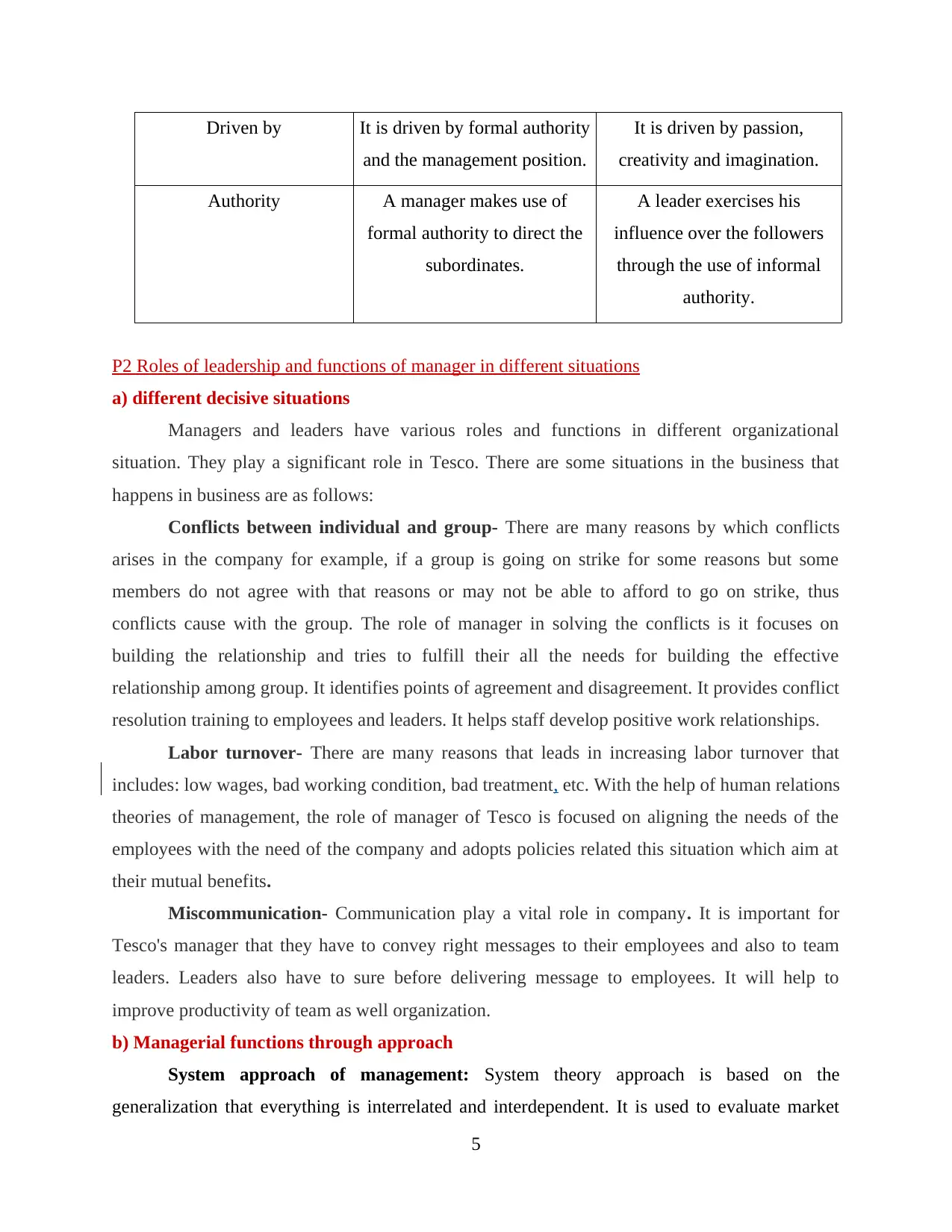
Driven by It is driven by formal authority
and the management position.
It is driven by passion,
creativity and imagination.
Authority A manager makes use of
formal authority to direct the
subordinates.
A leader exercises his
influence over the followers
through the use of informal
authority.
P2 Roles of leadership and functions of manager in different situations
a) different decisive situations
Managers and leaders have various roles and functions in different organizational
situation. They play a significant role in Tesco. There are some situations in the business that
happens in business are as follows:
Conflicts between individual and group- There are many reasons by which conflicts
arises in the company for example, if a group is going on strike for some reasons but some
members do not agree with that reasons or may not be able to afford to go on strike, thus
conflicts cause with the group. The role of manager in solving the conflicts is it focuses on
building the relationship and tries to fulfill their all the needs for building the effective
relationship among group. It identifies points of agreement and disagreement. It provides conflict
resolution training to employees and leaders. It helps staff develop positive work relationships.
Labor turnover- There are many reasons that leads in increasing labor turnover that
includes: low wages, bad working condition, bad treatment, etc. With the help of human relations
theories of management, the role of manager of Tesco is focused on aligning the needs of the
employees with the need of the company and adopts policies related this situation which aim at
their mutual benefits.
Miscommunication- Communication play a vital role in company. It is important for
Tesco's manager that they have to convey right messages to their employees and also to team
leaders. Leaders also have to sure before delivering message to employees. It will help to
improve productivity of team as well organization.
b) Managerial functions through approach
System approach of management: System theory approach is based on the
generalization that everything is interrelated and interdependent. It is used to evaluate market
5
and the management position.
It is driven by passion,
creativity and imagination.
Authority A manager makes use of
formal authority to direct the
subordinates.
A leader exercises his
influence over the followers
through the use of informal
authority.
P2 Roles of leadership and functions of manager in different situations
a) different decisive situations
Managers and leaders have various roles and functions in different organizational
situation. They play a significant role in Tesco. There are some situations in the business that
happens in business are as follows:
Conflicts between individual and group- There are many reasons by which conflicts
arises in the company for example, if a group is going on strike for some reasons but some
members do not agree with that reasons or may not be able to afford to go on strike, thus
conflicts cause with the group. The role of manager in solving the conflicts is it focuses on
building the relationship and tries to fulfill their all the needs for building the effective
relationship among group. It identifies points of agreement and disagreement. It provides conflict
resolution training to employees and leaders. It helps staff develop positive work relationships.
Labor turnover- There are many reasons that leads in increasing labor turnover that
includes: low wages, bad working condition, bad treatment, etc. With the help of human relations
theories of management, the role of manager of Tesco is focused on aligning the needs of the
employees with the need of the company and adopts policies related this situation which aim at
their mutual benefits.
Miscommunication- Communication play a vital role in company. It is important for
Tesco's manager that they have to convey right messages to their employees and also to team
leaders. Leaders also have to sure before delivering message to employees. It will help to
improve productivity of team as well organization.
b) Managerial functions through approach
System approach of management: System theory approach is based on the
generalization that everything is interrelated and interdependent. It is used to evaluate market
5
Paraphrase This Document
Need a fresh take? Get an instant paraphrase of this document with our AI Paraphraser
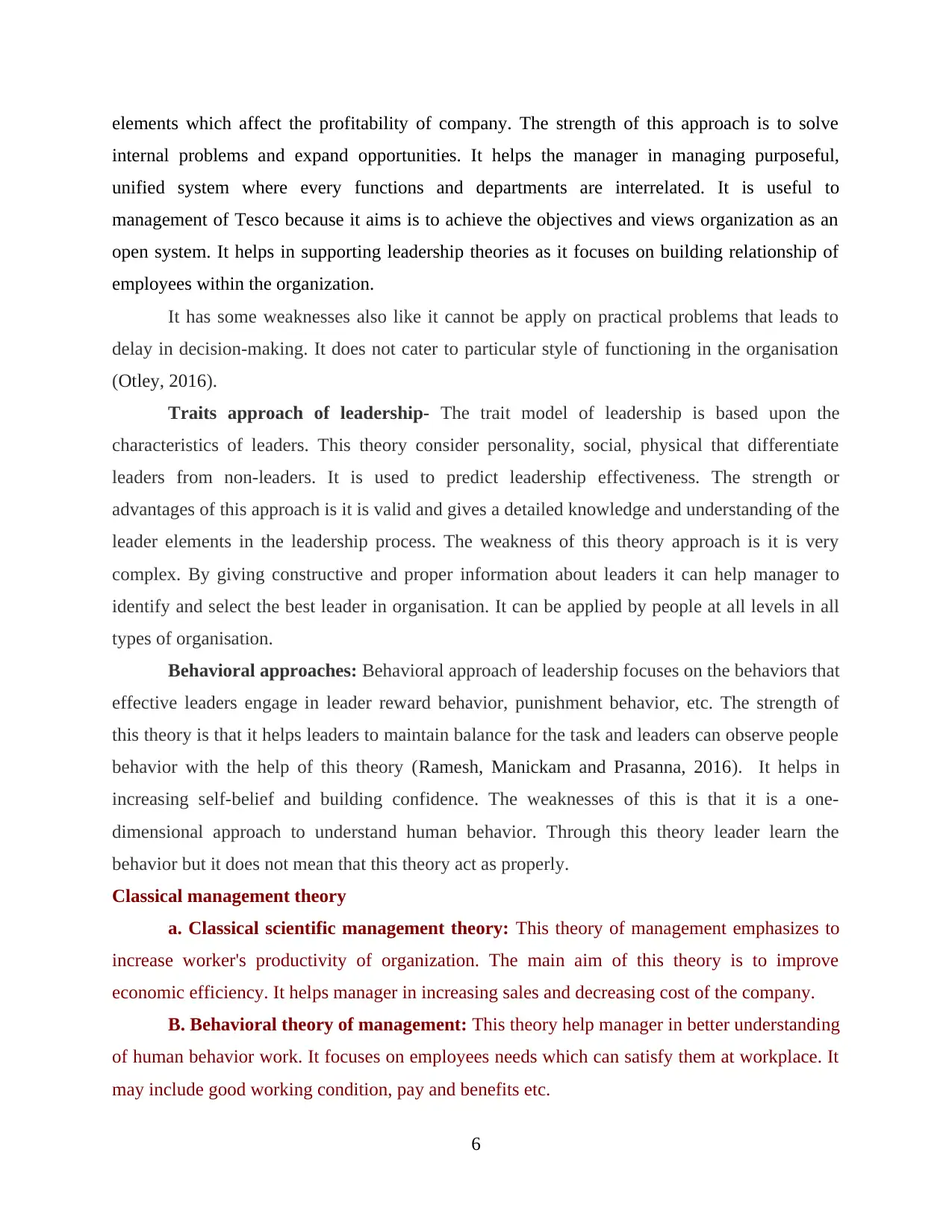
elements which affect the profitability of company. The strength of this approach is to solve
internal problems and expand opportunities. It helps the manager in managing purposeful,
unified system where every functions and departments are interrelated. It is useful to
management of Tesco because it aims is to achieve the objectives and views organization as an
open system. It helps in supporting leadership theories as it focuses on building relationship of
employees within the organization.
It has some weaknesses also like it cannot be apply on practical problems that leads to
delay in decision-making. It does not cater to particular style of functioning in the organisation
(Otley, 2016).
Traits approach of leadership- The trait model of leadership is based upon the
characteristics of leaders. This theory consider personality, social, physical that differentiate
leaders from non-leaders. It is used to predict leadership effectiveness. The strength or
advantages of this approach is it is valid and gives a detailed knowledge and understanding of the
leader elements in the leadership process. The weakness of this theory approach is it is very
complex. By giving constructive and proper information about leaders it can help manager to
identify and select the best leader in organisation. It can be applied by people at all levels in all
types of organisation.
Behavioral approaches: Behavioral approach of leadership focuses on the behaviors that
effective leaders engage in leader reward behavior, punishment behavior, etc. The strength of
this theory is that it helps leaders to maintain balance for the task and leaders can observe people
behavior with the help of this theory (Ramesh, Manickam and Prasanna, 2016). It helps in
increasing self-belief and building confidence. The weaknesses of this is that it is a one-
dimensional approach to understand human behavior. Through this theory leader learn the
behavior but it does not mean that this theory act as properly.
Classical management theory
a. Classical scientific management theory: This theory of management emphasizes to
increase worker's productivity of organization. The main aim of this theory is to improve
economic efficiency. It helps manager in increasing sales and decreasing cost of the company.
B. Behavioral theory of management: This theory help manager in better understanding
of human behavior work. It focuses on employees needs which can satisfy them at workplace. It
may include good working condition, pay and benefits etc.
6
internal problems and expand opportunities. It helps the manager in managing purposeful,
unified system where every functions and departments are interrelated. It is useful to
management of Tesco because it aims is to achieve the objectives and views organization as an
open system. It helps in supporting leadership theories as it focuses on building relationship of
employees within the organization.
It has some weaknesses also like it cannot be apply on practical problems that leads to
delay in decision-making. It does not cater to particular style of functioning in the organisation
(Otley, 2016).
Traits approach of leadership- The trait model of leadership is based upon the
characteristics of leaders. This theory consider personality, social, physical that differentiate
leaders from non-leaders. It is used to predict leadership effectiveness. The strength or
advantages of this approach is it is valid and gives a detailed knowledge and understanding of the
leader elements in the leadership process. The weakness of this theory approach is it is very
complex. By giving constructive and proper information about leaders it can help manager to
identify and select the best leader in organisation. It can be applied by people at all levels in all
types of organisation.
Behavioral approaches: Behavioral approach of leadership focuses on the behaviors that
effective leaders engage in leader reward behavior, punishment behavior, etc. The strength of
this theory is that it helps leaders to maintain balance for the task and leaders can observe people
behavior with the help of this theory (Ramesh, Manickam and Prasanna, 2016). It helps in
increasing self-belief and building confidence. The weaknesses of this is that it is a one-
dimensional approach to understand human behavior. Through this theory leader learn the
behavior but it does not mean that this theory act as properly.
Classical management theory
a. Classical scientific management theory: This theory of management emphasizes to
increase worker's productivity of organization. The main aim of this theory is to improve
economic efficiency. It helps manager in increasing sales and decreasing cost of the company.
B. Behavioral theory of management: This theory help manager in better understanding
of human behavior work. It focuses on employees needs which can satisfy them at workplace. It
may include good working condition, pay and benefits etc.
6
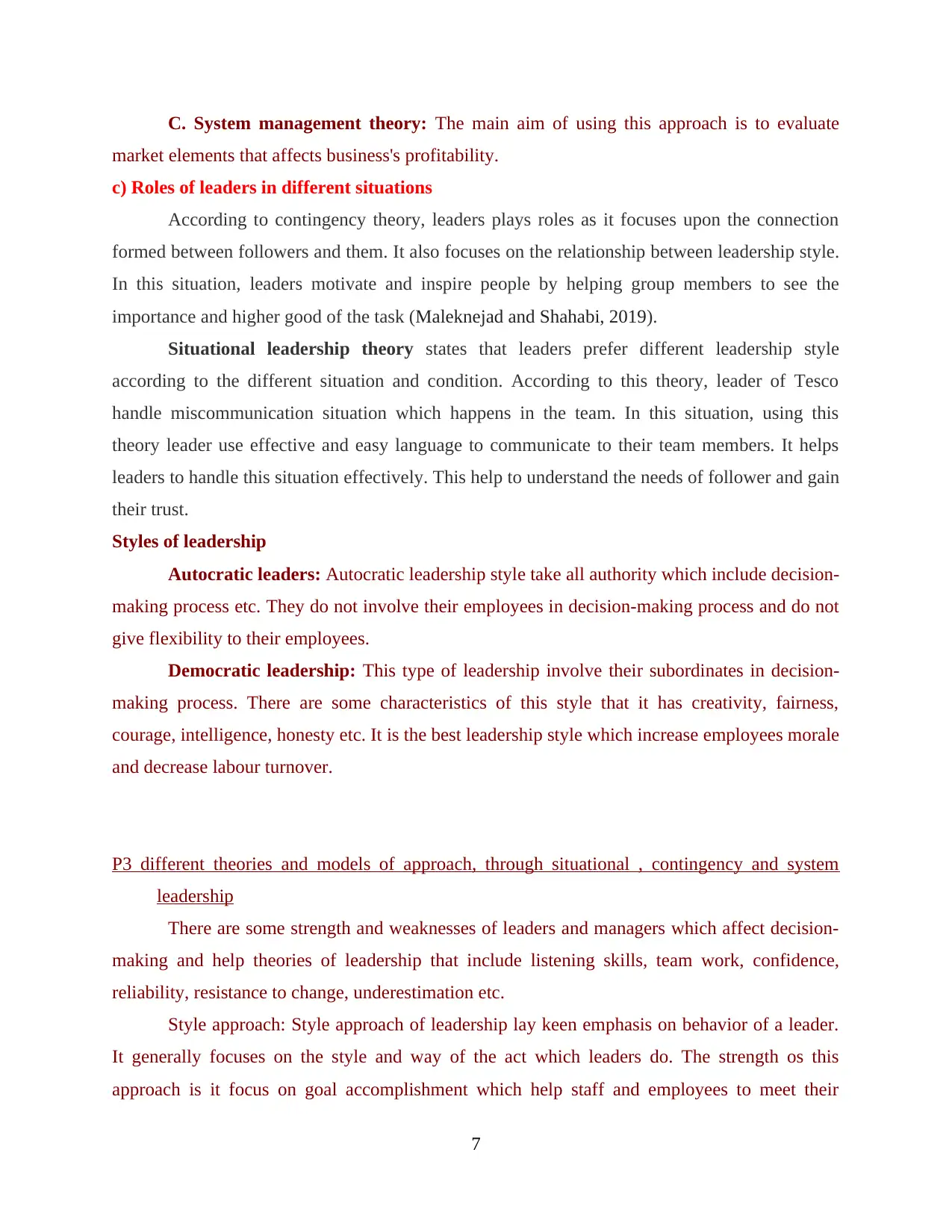
C. System management theory: The main aim of using this approach is to evaluate
market elements that affects business's profitability.
c) Roles of leaders in different situations
According to contingency theory, leaders plays roles as it focuses upon the connection
formed between followers and them. It also focuses on the relationship between leadership style.
In this situation, leaders motivate and inspire people by helping group members to see the
importance and higher good of the task (Maleknejad and Shahabi, 2019).
Situational leadership theory states that leaders prefer different leadership style
according to the different situation and condition. According to this theory, leader of Tesco
handle miscommunication situation which happens in the team. In this situation, using this
theory leader use effective and easy language to communicate to their team members. It helps
leaders to handle this situation effectively. This help to understand the needs of follower and gain
their trust.
Styles of leadership
Autocratic leaders: Autocratic leadership style take all authority which include decision-
making process etc. They do not involve their employees in decision-making process and do not
give flexibility to their employees.
Democratic leadership: This type of leadership involve their subordinates in decision-
making process. There are some characteristics of this style that it has creativity, fairness,
courage, intelligence, honesty etc. It is the best leadership style which increase employees morale
and decrease labour turnover.
P3 different theories and models of approach, through situational , contingency and system
leadership
There are some strength and weaknesses of leaders and managers which affect decision-
making and help theories of leadership that include listening skills, team work, confidence,
reliability, resistance to change, underestimation etc.
Style approach: Style approach of leadership lay keen emphasis on behavior of a leader.
It generally focuses on the style and way of the act which leaders do. The strength os this
approach is it focus on goal accomplishment which help staff and employees to meet their
7
market elements that affects business's profitability.
c) Roles of leaders in different situations
According to contingency theory, leaders plays roles as it focuses upon the connection
formed between followers and them. It also focuses on the relationship between leadership style.
In this situation, leaders motivate and inspire people by helping group members to see the
importance and higher good of the task (Maleknejad and Shahabi, 2019).
Situational leadership theory states that leaders prefer different leadership style
according to the different situation and condition. According to this theory, leader of Tesco
handle miscommunication situation which happens in the team. In this situation, using this
theory leader use effective and easy language to communicate to their team members. It helps
leaders to handle this situation effectively. This help to understand the needs of follower and gain
their trust.
Styles of leadership
Autocratic leaders: Autocratic leadership style take all authority which include decision-
making process etc. They do not involve their employees in decision-making process and do not
give flexibility to their employees.
Democratic leadership: This type of leadership involve their subordinates in decision-
making process. There are some characteristics of this style that it has creativity, fairness,
courage, intelligence, honesty etc. It is the best leadership style which increase employees morale
and decrease labour turnover.
P3 different theories and models of approach, through situational , contingency and system
leadership
There are some strength and weaknesses of leaders and managers which affect decision-
making and help theories of leadership that include listening skills, team work, confidence,
reliability, resistance to change, underestimation etc.
Style approach: Style approach of leadership lay keen emphasis on behavior of a leader.
It generally focuses on the style and way of the act which leaders do. The strength os this
approach is it focus on goal accomplishment which help staff and employees to meet their
7
⊘ This is a preview!⊘
Do you want full access?
Subscribe today to unlock all pages.

Trusted by 1+ million students worldwide
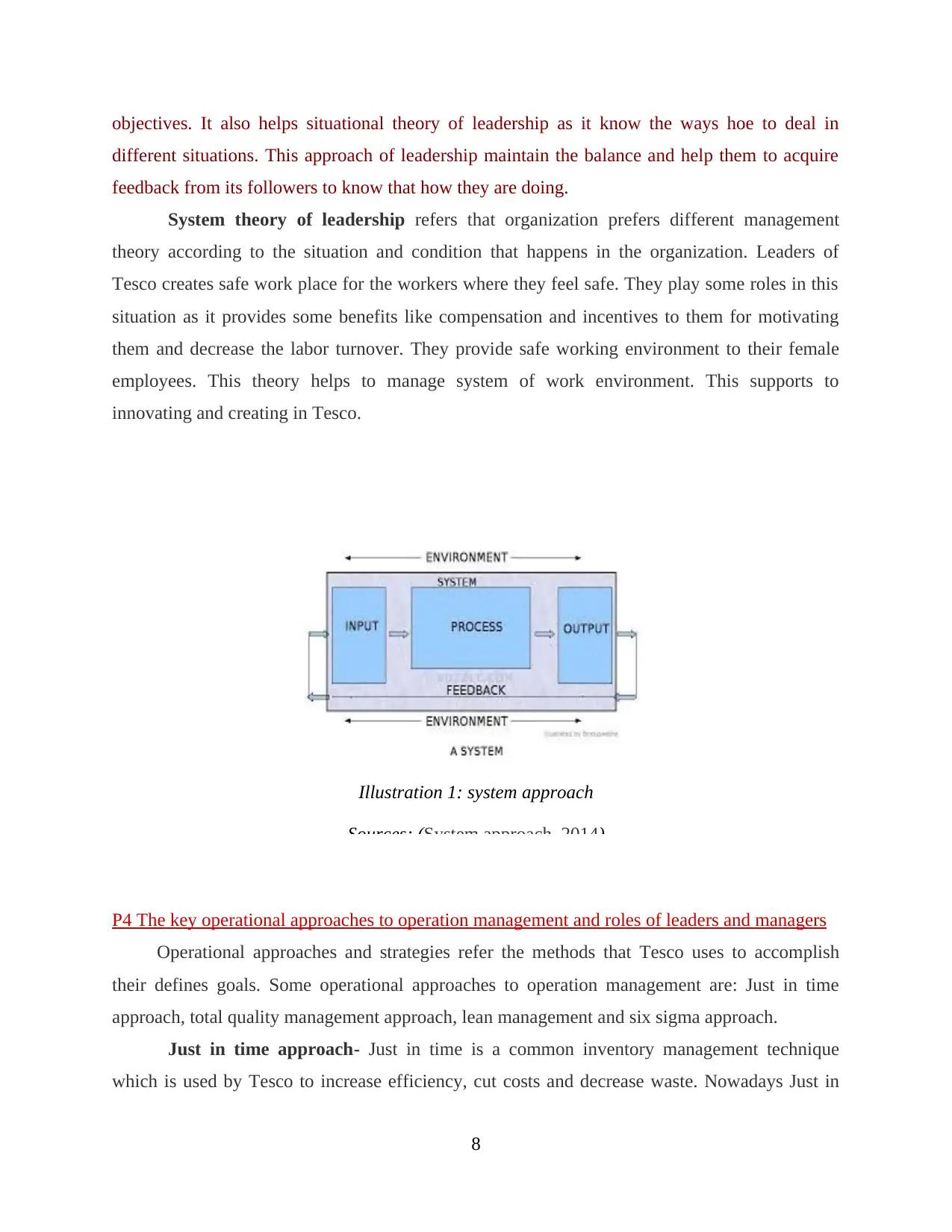
objectives. It also helps situational theory of leadership as it know the ways hoe to deal in
different situations. This approach of leadership maintain the balance and help them to acquire
feedback from its followers to know that how they are doing.
System theory of leadership refers that organization prefers different management
theory according to the situation and condition that happens in the organization. Leaders of
Tesco creates safe work place for the workers where they feel safe. They play some roles in this
situation as it provides some benefits like compensation and incentives to them for motivating
them and decrease the labor turnover. They provide safe working environment to their female
employees. This theory helps to manage system of work environment. This supports to
innovating and creating in Tesco.
P4 The key operational approaches to operation management and roles of leaders and managers
Operational approaches and strategies refer the methods that Tesco uses to accomplish
their defines goals. Some operational approaches to operation management are: Just in time
approach, total quality management approach, lean management and six sigma approach.
Just in time approach- Just in time is a common inventory management technique
which is used by Tesco to increase efficiency, cut costs and decrease waste. Nowadays Just in
8
Illustration 1: system approach
Sources: (System approach, 2014)
different situations. This approach of leadership maintain the balance and help them to acquire
feedback from its followers to know that how they are doing.
System theory of leadership refers that organization prefers different management
theory according to the situation and condition that happens in the organization. Leaders of
Tesco creates safe work place for the workers where they feel safe. They play some roles in this
situation as it provides some benefits like compensation and incentives to them for motivating
them and decrease the labor turnover. They provide safe working environment to their female
employees. This theory helps to manage system of work environment. This supports to
innovating and creating in Tesco.
P4 The key operational approaches to operation management and roles of leaders and managers
Operational approaches and strategies refer the methods that Tesco uses to accomplish
their defines goals. Some operational approaches to operation management are: Just in time
approach, total quality management approach, lean management and six sigma approach.
Just in time approach- Just in time is a common inventory management technique
which is used by Tesco to increase efficiency, cut costs and decrease waste. Nowadays Just in
8
Illustration 1: system approach
Sources: (System approach, 2014)
Paraphrase This Document
Need a fresh take? Get an instant paraphrase of this document with our AI Paraphraser
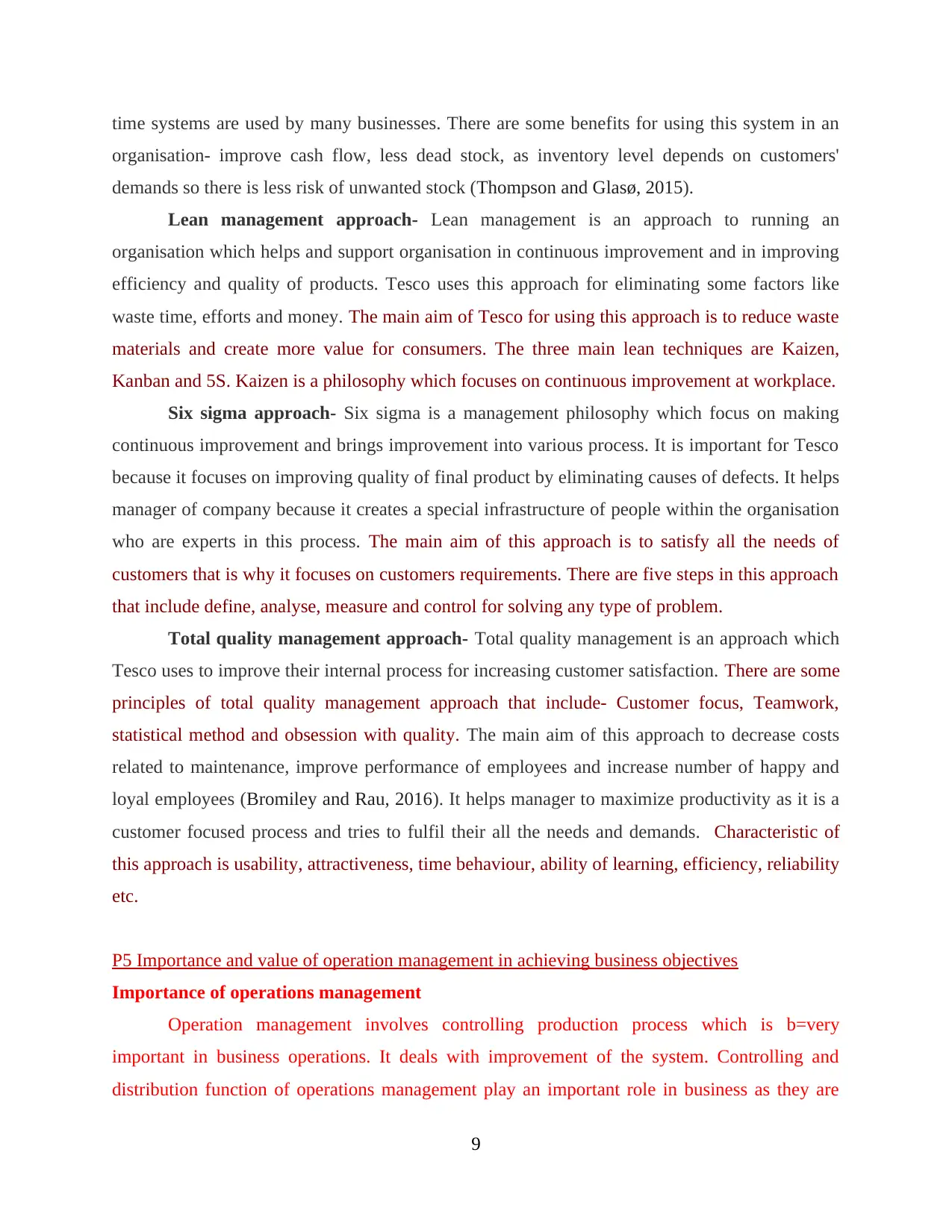
time systems are used by many businesses. There are some benefits for using this system in an
organisation- improve cash flow, less dead stock, as inventory level depends on customers'
demands so there is less risk of unwanted stock (Thompson and Glasø, 2015).
Lean management approach- Lean management is an approach to running an
organisation which helps and support organisation in continuous improvement and in improving
efficiency and quality of products. Tesco uses this approach for eliminating some factors like
waste time, efforts and money. The main aim of Tesco for using this approach is to reduce waste
materials and create more value for consumers. The three main lean techniques are Kaizen,
Kanban and 5S. Kaizen is a philosophy which focuses on continuous improvement at workplace.
Six sigma approach- Six sigma is a management philosophy which focus on making
continuous improvement and brings improvement into various process. It is important for Tesco
because it focuses on improving quality of final product by eliminating causes of defects. It helps
manager of company because it creates a special infrastructure of people within the organisation
who are experts in this process. The main aim of this approach is to satisfy all the needs of
customers that is why it focuses on customers requirements. There are five steps in this approach
that include define, analyse, measure and control for solving any type of problem.
Total quality management approach- Total quality management is an approach which
Tesco uses to improve their internal process for increasing customer satisfaction. There are some
principles of total quality management approach that include- Customer focus, Teamwork,
statistical method and obsession with quality. The main aim of this approach to decrease costs
related to maintenance, improve performance of employees and increase number of happy and
loyal employees (Bromiley and Rau, 2016). It helps manager to maximize productivity as it is a
customer focused process and tries to fulfil their all the needs and demands. Characteristic of
this approach is usability, attractiveness, time behaviour, ability of learning, efficiency, reliability
etc.
P5 Importance and value of operation management in achieving business objectives
Importance of operations management
Operation management involves controlling production process which is b=very
important in business operations. It deals with improvement of the system. Controlling and
distribution function of operations management play an important role in business as they are
9
organisation- improve cash flow, less dead stock, as inventory level depends on customers'
demands so there is less risk of unwanted stock (Thompson and Glasø, 2015).
Lean management approach- Lean management is an approach to running an
organisation which helps and support organisation in continuous improvement and in improving
efficiency and quality of products. Tesco uses this approach for eliminating some factors like
waste time, efforts and money. The main aim of Tesco for using this approach is to reduce waste
materials and create more value for consumers. The three main lean techniques are Kaizen,
Kanban and 5S. Kaizen is a philosophy which focuses on continuous improvement at workplace.
Six sigma approach- Six sigma is a management philosophy which focus on making
continuous improvement and brings improvement into various process. It is important for Tesco
because it focuses on improving quality of final product by eliminating causes of defects. It helps
manager of company because it creates a special infrastructure of people within the organisation
who are experts in this process. The main aim of this approach is to satisfy all the needs of
customers that is why it focuses on customers requirements. There are five steps in this approach
that include define, analyse, measure and control for solving any type of problem.
Total quality management approach- Total quality management is an approach which
Tesco uses to improve their internal process for increasing customer satisfaction. There are some
principles of total quality management approach that include- Customer focus, Teamwork,
statistical method and obsession with quality. The main aim of this approach to decrease costs
related to maintenance, improve performance of employees and increase number of happy and
loyal employees (Bromiley and Rau, 2016). It helps manager to maximize productivity as it is a
customer focused process and tries to fulfil their all the needs and demands. Characteristic of
this approach is usability, attractiveness, time behaviour, ability of learning, efficiency, reliability
etc.
P5 Importance and value of operation management in achieving business objectives
Importance of operations management
Operation management involves controlling production process which is b=very
important in business operations. It deals with improvement of the system. Controlling and
distribution function of operations management play an important role in business as they are
9
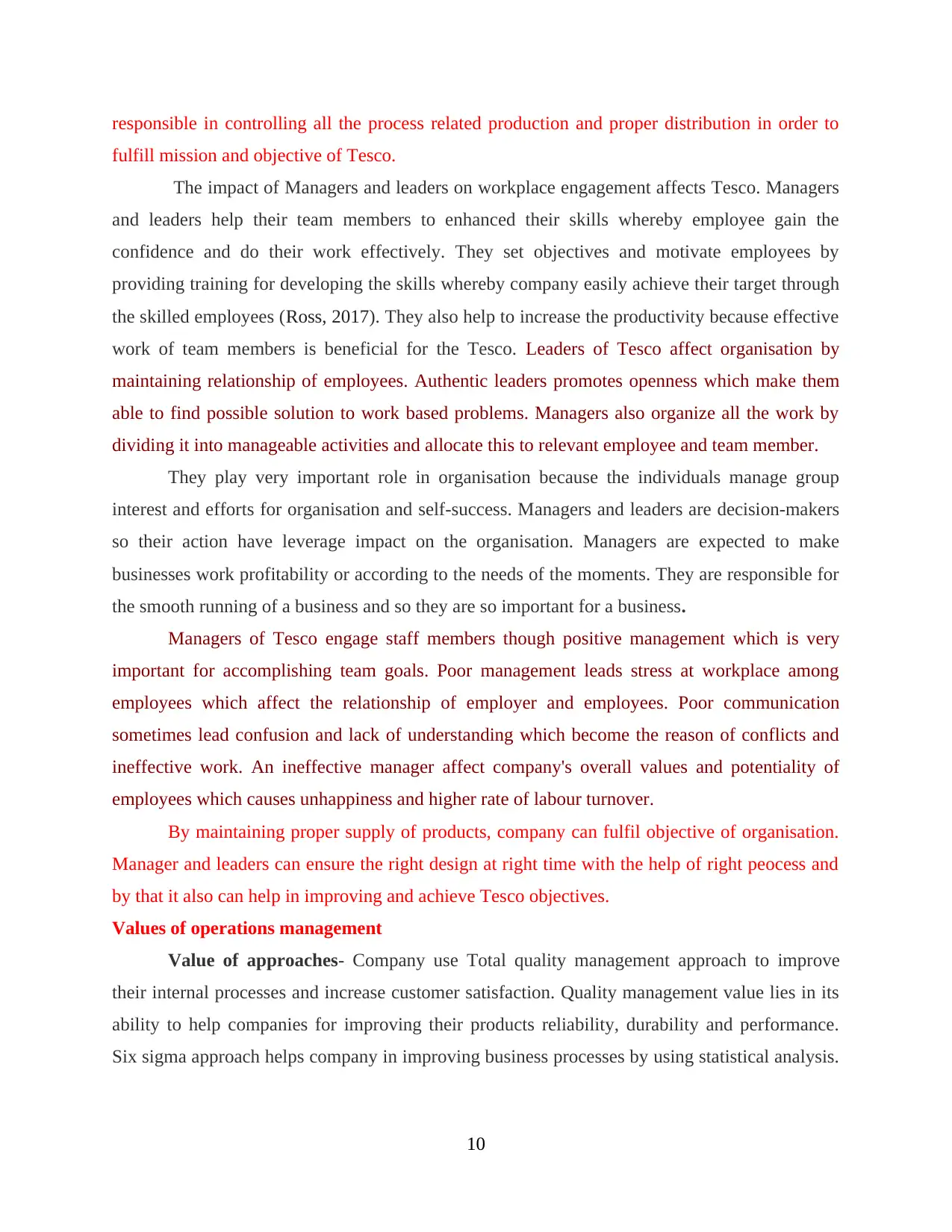
responsible in controlling all the process related production and proper distribution in order to
fulfill mission and objective of Tesco.
The impact of Managers and leaders on workplace engagement affects Tesco. Managers
and leaders help their team members to enhanced their skills whereby employee gain the
confidence and do their work effectively. They set objectives and motivate employees by
providing training for developing the skills whereby company easily achieve their target through
the skilled employees (Ross, 2017). They also help to increase the productivity because effective
work of team members is beneficial for the Tesco. Leaders of Tesco affect organisation by
maintaining relationship of employees. Authentic leaders promotes openness which make them
able to find possible solution to work based problems. Managers also organize all the work by
dividing it into manageable activities and allocate this to relevant employee and team member.
They play very important role in organisation because the individuals manage group
interest and efforts for organisation and self-success. Managers and leaders are decision-makers
so their action have leverage impact on the organisation. Managers are expected to make
businesses work profitability or according to the needs of the moments. They are responsible for
the smooth running of a business and so they are so important for a business.
Managers of Tesco engage staff members though positive management which is very
important for accomplishing team goals. Poor management leads stress at workplace among
employees which affect the relationship of employer and employees. Poor communication
sometimes lead confusion and lack of understanding which become the reason of conflicts and
ineffective work. An ineffective manager affect company's overall values and potentiality of
employees which causes unhappiness and higher rate of labour turnover.
By maintaining proper supply of products, company can fulfil objective of organisation.
Manager and leaders can ensure the right design at right time with the help of right peocess and
by that it also can help in improving and achieve Tesco objectives.
Values of operations management
Value of approaches- Company use Total quality management approach to improve
their internal processes and increase customer satisfaction. Quality management value lies in its
ability to help companies for improving their products reliability, durability and performance.
Six sigma approach helps company in improving business processes by using statistical analysis.
10
fulfill mission and objective of Tesco.
The impact of Managers and leaders on workplace engagement affects Tesco. Managers
and leaders help their team members to enhanced their skills whereby employee gain the
confidence and do their work effectively. They set objectives and motivate employees by
providing training for developing the skills whereby company easily achieve their target through
the skilled employees (Ross, 2017). They also help to increase the productivity because effective
work of team members is beneficial for the Tesco. Leaders of Tesco affect organisation by
maintaining relationship of employees. Authentic leaders promotes openness which make them
able to find possible solution to work based problems. Managers also organize all the work by
dividing it into manageable activities and allocate this to relevant employee and team member.
They play very important role in organisation because the individuals manage group
interest and efforts for organisation and self-success. Managers and leaders are decision-makers
so their action have leverage impact on the organisation. Managers are expected to make
businesses work profitability or according to the needs of the moments. They are responsible for
the smooth running of a business and so they are so important for a business.
Managers of Tesco engage staff members though positive management which is very
important for accomplishing team goals. Poor management leads stress at workplace among
employees which affect the relationship of employer and employees. Poor communication
sometimes lead confusion and lack of understanding which become the reason of conflicts and
ineffective work. An ineffective manager affect company's overall values and potentiality of
employees which causes unhappiness and higher rate of labour turnover.
By maintaining proper supply of products, company can fulfil objective of organisation.
Manager and leaders can ensure the right design at right time with the help of right peocess and
by that it also can help in improving and achieve Tesco objectives.
Values of operations management
Value of approaches- Company use Total quality management approach to improve
their internal processes and increase customer satisfaction. Quality management value lies in its
ability to help companies for improving their products reliability, durability and performance.
Six sigma approach helps company in improving business processes by using statistical analysis.
10
⊘ This is a preview!⊘
Do you want full access?
Subscribe today to unlock all pages.

Trusted by 1+ million students worldwide
1 out of 22
Related Documents
Your All-in-One AI-Powered Toolkit for Academic Success.
+13062052269
info@desklib.com
Available 24*7 on WhatsApp / Email
![[object Object]](/_next/static/media/star-bottom.7253800d.svg)
Unlock your academic potential
Copyright © 2020–2026 A2Z Services. All Rights Reserved. Developed and managed by ZUCOL.




